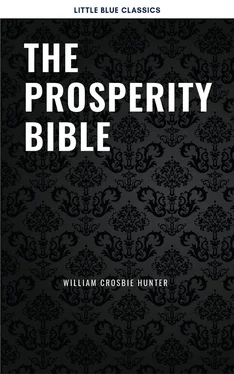It is reasonable to suppose that this first life was in single-celled organisms, but behind these cells was the insistent urge of Spirit, the Great One Life seeking expression. And soon organisms having too much life to express themselves with one cell had two cells and then many, and still more life was poured into them.
Multiple-celled organisms were formed; plants, trees, vertebrates, and mammals, many of them with strange shapes, but all were perfect after their kind as everything is that God makes. No doubt there were crude and almost monstrous forms of both animal and plant life; but everything filled its purpose in its day and it was all very good.
Then another day came, the great day of the evolutionary process, a day when the morning stars sang together and the sons of God shouted for joy to behold the beginning of the end, for man, the object aimed at from the beginning, had appeared upon the scene. An ape-like being, little different from the beasts around him in appearance, but infinitely different capacity for growth and thought. Art and beauty, architecture and song, poetry and music, all these were unrealized possibilities in that ape man’s soul. And for his time and kind he was very good.
“It is God that works in you to will and to do of his good pleasure,” says St. Paul. From the day the first man appeared God began to work IN men, putting more and more of himself into each succeeding generation, urging them on to larger achievements and to better conditions, social, governmental, and domestic. Those who looking back into ancient history see the awful conditions which existed, the barbarities, idolatries, and sufferings, and reading about God in connection with these things are disposed to feel that he was cruel and unjust to man, should pause to think. From the ape-man to the coming Christ man the race has had to rise. And it could only be accomplished by the successive unfolding of the various powers and possibilities latent in the human brain.
God desired to express himself, to live in form, and not only that, but to live in a form through which he could express himself on the highest moral and spiritual plane. God wanted to evolve a form in which he could live as a god and manifest himself as a god. This was the aim of the evolutionary force. The ages of warfare, bloodshed, suffering, injustice, and cruelty were tempered in many ways with love and justice as time advanced.
And this was developing the brain of man to a point where it should be capable of giving full expression to the love and justice of God. The end is not yet; God aims not at the perfection of a few choice specimens for exhibition, like the large berries at the top of the box, but at the glorification of the race. The time will come when the Kingdom of God shall be established on earth; the time foreseen by the dreamer of the Isle of Patmos, when there shall be no more crying, neither shall there be any more pain, for the former things are all passed away, and there shall be no night there.
I HAVE brought you thus far through the two preceding chapters with a view to finally settling the question of duty. This is one that puzzles and perplexes very many people who are earnest and sincere, and gives them a great deal of difficulty in its solution.
When they start out to make something of themselves and to practice the science of being great, they find themselves necessarily compelled to rearrange many of their relationships.
There are friends who perhaps must be alienated, there are relatives who misunderstand and who feel that they are in some way being slighted; the really great man is often considered selfish by a large circle of people who are connected with him and who feel that he might bestow upon them more benefits than he does. The question at the outset is: Is it my duty to make the most of myself regardless of everything else? Or shall I wait until I can do so without any friction or without causing loss to any one? This is the question of duty to self vs. duty to others.
One’s duty to the world has been thoroughly discussed in the preceding pages and I give some consideration now to the idea of duty to God. An immense number of people have a great deal of uncertainty, not to say anxiety, as to what they ought to do for God.
The amount of work and service that is done for him in these United States in the way of church work and so on is enormous. An immense amount of human energy is expended in what is called serving God. I propose to consider briefly what serving God is and how a man may serve God best, and I think I shall be able to make plain that the conventional idea as to what constitutes service to God is all wrong.
When Moses went down into Egypt to bring out the Hebrews from bondage, his demand upon Pharaoh, in the name of the Deity, was, “Let the people go that they may serve me.” He led them out into the wilderness and there instituted a new form of worship which has led many people to suppose that worship constitutes the service of God, although later God himself distinctly declared that he cared nothing for ceremonies, burned offerings, or oblation, and the teaching of Jesus if rightly understood, would do away with organized temple worship altogether. God does not lack anything that men may do for him with their hands or bodies or voices. Saint Paul points out that man can do nothing for God, for God does not need anything.
The view of evolution that we have taken shows God seeking expression through man. Through all the successive ages in which his spirit has urged man up the height, God has gone on seeking expression. Every generation of men is more Godlike than the preceding generation. Every generation of men demands more in the way of fine homes, pleasant surroundings, congenial work, rest, travel, and opportunity for study than the preceding generation.
I have heard some shortsighted economists argue that the working people of today ought surely to be fully contented because their condition is so much better than that of the workingman two hundred years ago who slept in a windowless hut on a floor covered with rushes in company with his pigs. If that man had all that he was able to use for the living of all the life he knew how to live, he was perfectly content, and if he had lack he was not contented. The man of today has a comfortable home and very many things, indeed, that were unknown a short period back in the past, and if he has all that he can use for the living of all the life he can imagine, he will be content. But he is not content. God has lifted the race so far that any common man can picture a better and more desirable life than he is able to live under existing conditions.
And so long as this is true, so long as a man can think and clearly picture to himself a more desirable life, he will be discontented with the life he has to live, and rightly so. That discontent is the Spirit of God urging men on to more desirable conditions. It is God who seeks expression in the race. “He works in us to will and to do.”
The only service you can render God is to give expression to what he is trying to give the world, through you. The only service you can render God is to make the very most of yourself in order that God may live in you to the utmost of your possibilities. In a former work of this series (The Science of Getting Rich), I refer to the little boy at the piano, the music in whose soul could not find expression through his untrained hands. This is a good illustration of the way the Spirit of God is over, about, around, and in all of us, seeking to do great things with us, so soon as we will train our hands and feet, our minds, brains, and bodies to do his service.
Your first duty to God, to yourself, and to the world is to make yourself as great a personality, in every way, as you possibly can. And that, it seems to me, disposes of the question of duty. There are one or two other things that might be disposed of in closing this chapter. I have written of opportunity in a preceding chapter. I have said, in a general way, that it is within the power of every man to become great, just as in “The Science of Getting Rich” I declared that it is within the power of every man to become rich. But these sweeping generalizations need qualifying. There are men who have such materialistic minds that they are absolutely incapable of comprehending the philosophy set forth in these books.
Читать дальше












